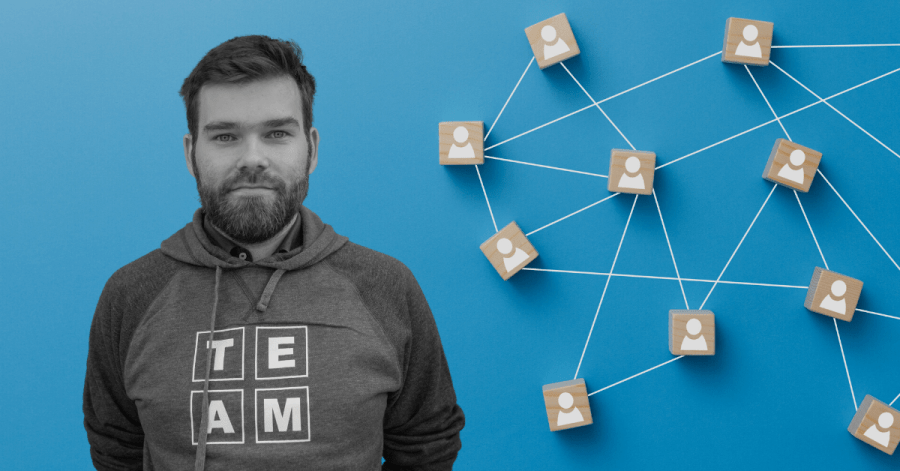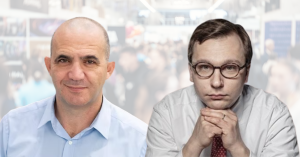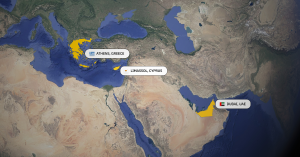Today, we meet with Razvan Craciunescu– an entrepreneur and a professor from Bucharest with a passion for problem solving and giving back After completing his education at the University Politehnica of Bucharest, Razvan became skilled engineer and product manager, taking on different roles in IT and telecommunications. He has worked for the Romanian unicorn company UiPath and is currently in charge of leading the growth of PROCESIO, a low/ no-code Integration Platform as a Service (iPaaS) empowering organizations to integrate software, services, and apps, process data, and automate processes and workflows.
Razvan has a rich background in investing in startups and helping them grow. He’s part of TechAngels Romania.
Although he has been working in the field of engineering and telecommunications, he found his passion in teaching and inspiring younger generations of Romanian entrepreneurs. Currently, he is back to his Alma Mater as an Associate Professor and Coordinator of the 5G lab in the University, which welcomes students, alumni, and startups to test their products before bringing them to market.
In this interview, Razvan shares his experience and his core values for what a growth vision should be for one starting in the innovation ecosystem. From his path from university to a myriad of leadership positions and back again to the university, Razvan tells us about his philosophy as an investor and his goal to elevate tech transfer in Romania.
The Recursive: Tell me more about yourself. Where did it all start?
Razvan Craciunescu, Associate Professor University Politehnica of Bucharest: I have multiple hats. I am an Associate Professor at the University Politehnica of Bucharest in the field of telecommunications. I entered the Ph.D. studies in 2012 and started teaching at the University Politehnica first as a teaching assistant then as an assistant professor, and now as an associate professor. I am also coordinating the 5G lab at the University. The 5G lab is sponsored by private money from the telecom company Orange Romania. We are doing research on 5G and OpenRAN and the future of 5G, 6G.
In 2014, while working for Aalborg University, Denmark, I was at a Start-up weekend event. I was fascinated by the idea of how to create a startup. Then I read the first startup book, “Lean startup” by Erik Ries. This is how my startup journey began. In 2015 I founded a startup in the IoT field. We tried to do some things, in the hardware space, but it was hard, usually it’s harder with hardware than with software. Then we shifted to software and had some projects about serious games or training games.
Then I joined UiPath and after a while it became the first unicorn of Romania. After leaving UiPath, I started to be more involved in the startup ecosystem around the university or how to help more students or researchers found a startup or a spin-off. I started the first spin-off track at Innovation Lab which is the biggest pre-accelerator university program here in Romania. We are looking for researchers with research that could be commercialized and we try to help them learn a little more about how to make a business plan, what an investor will look for if you want to go for an investment or how you can protect your intellectual property rights. Recently, I am more involved in the tech transfer or IP commercialization fields. I want to understand how I can help researchers and IP owners from the university to commercialize their research.
Your C.V. is impressive, you have worked with prominent names in the tech ecosystem, like UiPath, and now PROCESIO, but what makes you go back to education, to teach?
I’ve always liked teaching. The interactions I have with students, having a debate on different topics, having some math problems that we can solve together, and to understand together the logic behind a solution. To find out that there are multiple solutions to an engineering question or if there is already one why that is the optimal one. I like a lot being in contact with the new generation because you know the newest jokes, but you also understand how things evolve. I am trying to embed entrepreneurship thinking in engineering. I invite a lot of people from the ecosystem to courses and lecture the students about engineering from an entrepreneurship perspective. Why a solution to a problem is an engineering one but also a commercial one.
I see, it’s like a back-and-forth process. You teach them entrepreneurial thinking, but you also gain learning experience from them.
Yes, you know what they say -when you teach something, you understand it better for yourself. Nowadays, there is a focus that universities should be a major player in the entrepreneurship ecosystem – by providing soft skills to future entrepreneurs or to future startup employees.
What can you share with us about the educational system in Romania – where is it now, where is it heading, what does it need?
Our university system is pretty similar to most European ones. I recently went to Hungary, with the EELISA Unfolds project, and they also have similar problems, like there are not a lot of students that want to remain to teach.
Most of the students go to the industry and that’s normal but we would like to have more students to stay in university and teach to the future engineers.
What I can see in Romania is this wave of implementing entrepreneurship in universities. I think almost all technical or non-technical universities have entrepreneurship programs and departments. They are trying to bring well known entrepreneurs to speak to their students. Тhey are trying to add more soft skills, they are open to partner with incubators, accelerators to do joint or shared programs for their students. Something that universities would like to do more is how they can increase their involvement in a startup, how they can be more of help, how they can take equity or how to monetize the intellectual property rights for their researchers, for them to be an even more important player.
In Romania universities have a lot of equipment. I have a 5G lab where we have the first 5G StandAlone network in Romania, so startups could come and access it and try to do some implementation on top of this, before thеir 5G product to get to the commercial network. So, everything at the lab is in the experiment phase. People from the market could come and show their product by coming to the lab and trying their 5G products. This is an example, I know that in universities we have chemistry labs, labs that are growing artificial skin and so on. If you have a good researcher, he could patent or maybe he could spin out a company and the university would like to be more involved in the process. So, these are some trends in this area of technology and commercialization. Also, for universities it is very hard to find skilled employees because usually in Romania universities are state owned universities, so their budget is low and they don’t have high paying salaries like in the industry. There are some NGOs here in Romania and some mini-initiatives that are trying to train professors to think more in an entrepreneur mindset so that they can propagate this mindset.
How do you want to leave your mark in the educational system and can you share more about your current project, the Entrepreneurship Innovation and Future Technologies Lab, part of the Politehnica University in Bucharest?
Тhе lab is usually used for internships in entrepreneurship. Some of my current projects are working on a new public policy on tech transfer, mainly understanding what are some shortcomings in the tech transfer now and how we can address this. Because at university level we don’t have or it’s very hard to attract tech transfer specialists. We did a study on how we can do this and what budgets are available through these European programs like Recovery and Resilience plan or some Structural Funds so that we can increase the value of technology transfers in the universities. So that the universities would have more impact in terms of patents and patents that could be commercialized not just as patents that are sitting on a shelf so nobody is using them.
In September between 19 – 22nd, I am a co-organiser of Entrepreneurship for Educators program. Together with the Romanian American Foundation, the University of Bucharest and an association that I am leading called “Education for entrepreneurship association”. We manage to bring to Romania Babson College, one of the best colleges in the US on entrepreneurship education, to teach 40 Romanian professors from 14 universities in the country how to think as an educator in terms of entrepreneurship and how to teach entrepreneurship. I try to be an advocate that Romania needs a tech transfer fund to fund this gap between research and commercialisation. Usually, VC funds in Romania and all over the world are not investing in this research-to-technology-ready market gap.
What attracted you to join PROCESIO as a Chief Product Growth Officer and can you share more about the solution you are building?
PROCESIO is a no code, low-code, full-code platform. It’s an integration platform as a service. Now, you have digital tools for everything – CRM, ERP, Mail, your invoice system, your financial system and so on. It’s not easy to share data between them, usually people do it manually. PROCESIO wants to decrease this manual work by being a platform that can integrate multiple digital platforms so that your employees can do more creative jobs than just moving data from one tool to another.
I joined PROCESIO because I really liked the team and they are building a product from scratch. It takes a lot of courage to build your own product and I am trying to help them understand their users, attract more users, generate relevant content for the newsletter to increase our user base or make this user base more committed to the platform.
How do you keep improving your skill set to evolve as a teacher, developer, and investor? And what skills should one have for each of these “hats”?
I have the general skill to be curious and read a lot. I am subscribed to multiple newsletters that are showing me trends about what people invest in on a global level and how the economy is doing.
From a professor’s point of view, I am already in touch with new research that is done in my field. I am trying to see how people from other universities implement some systems and try to replicate them. In the 5G lab I am speaking with a lot of people from the ecosystem, joining meetups, networking, and understanding where everything is headed.
I think one of the skills that I have and nurture is being curious, asking questions, and understanding trends. How everything is evolving. I think that this is a skill you will need your whole life and is not something that is restricted to one area or another.
If you are somebody that is painting or somebody that is coding you always have to learn something new and also to try to interconnect multiple disciplines.
Like engineering and entrepreneurship, with investments, or being a chief product owner, or understanding the tech transfer, or intellectual property rights or public policy. Usually people who have this helicopter view, could bring creative solutions to a certain niche or a problem.
Based on such a diverse professional background as you have, what can you tell us about your modus operandi as an investor? What solutions are you looking after?
I usually invest at an early stage. So, I am mainly looking at the team if I am investing alone. Also, because I am in different angel investors groups here in Romania, I am also looking at what others are investing in and what their feedback is. I look at people who are experts in a field and I try to understand their motives. If I know the team from before, I would like to have some type of chemistry. If you see the pitch deck and the team and speak to them and see they understand each other and the solution is a good one, then the team seems like the best team to implement it.
Is communication a value that you think is important for a team to have?
Yes, communication is very important because you are going to resolve conflicts easier and faster. If everybody thinks they have the best idea than the others you don’t have brainstorming and you don’t have cohesion in your team.
You are helping shape the next generation of entrepreneurs and IT professionals. What traits or values make you invest in a founder or a team? How should the new generations go about developing theirs?
Entrepreneurs should have continuous learning skill. Listen to all the ideas that are around them and take the best decision based on the opinion of the people they consider to be valuable. To have a team spirit and values. To know that if you are alone you can’t do much, so you need a team that could help you grow. To be curious about what they are doing, what are the trends in their field and what are their users saying about their product. Test every assumption as fast as possible and always be ready to pivot if you see that you are stuck.







